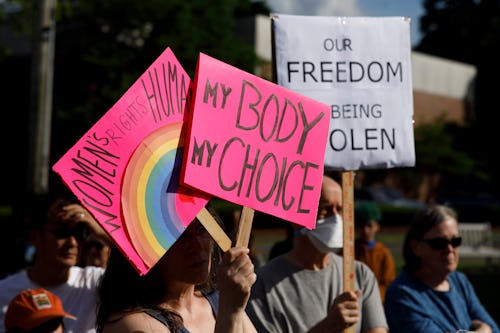
It’s been three days since the lopsidedly conservative United States Supreme Court ruled that people don’t have a federal right to reproductive health care. While Democratic lawmakers have largely — but not exclusively — bungled their response to the Court’s seismic overturning of the nearly 50-year precedent established by 1973’s Roe v. Wade, a new poll released Monday suggests that the party’s base is already looking ahead to the midterm elections with a renewed sense of urgency and purpose.
According to a NPR/PBS NewsHour/Marist National poll conducted in the days following the Court’s decision on Dobbs v. Jackson Women’s Health Organization, a significant majority of the United States not only opposes the move to strike down Roe, but is newly motivated to vote this coming November as a result. All told, 56% of the country disagrees with the decision, with 45% of that bloc indicating they “strongly” oppose the decision. Similar margins of respondents also said they believed the Court’s ruling was politically motivated, and will likely put other rights, such as same-sex marriage and access to contraceptives, in jeopardy.
Crucially, the poll found that an overwhelming majority of Democrats — 78% — said that last week’s ruling would make them more likely to vote in the midterm elections this coming November, compared to just 54% of Republicans. Similarly, despite historical headwinds and a confluence of factors in their way, Democrats now have a 48%-41% advantage over Republicans on a generic midterm ballot.
“With the midterm elections less than five months away, the decision by SCOTUS has sent shockwaves through the electorate,” Lee M. Miringoff, the director of the Marist College Institute for Public Opinion, explained in a press release accompanying the polling results. The poll was conducted June 24-25 among 941 respondents. “Men are +12 points and women are +18 points more likely to support congressional candidates who pledge to codify the protections of Roe v. Wade. Digging deeper, 63% of women, including 74% of suburban women, are also concerned that the Court’s decision is a harbinger of things to come.”
Despite unambiguous indications of a groundswell of pro-abortion action on the part of Democratic voters, a slim majority of respondents nevertheless said they opposed efforts to expand the Supreme Court’s membership, even though that would serve as a counterbalance to the currently lopsided conservative majority that brought us to this point. As pollsters found, the disinclination to pack the court comes as public opinion about the Supreme Court has plummeted to historic lows — from 60% indicating confidence in the judicial institution as recently as 2019 to just 39% today. Given that cratering sense of confidence, it’s perhaps little surprise that the public would also not be interested in expanding the membership of a body they fundamentally don’t trust.







